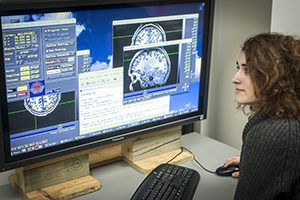What does it really mean to have a short attention span? What’s going on inside the brain?
Wendy Huddleston, associate professor in UWM’s College of Health Sciences, has teamed up with faculty and students from both UWM and the Medical College of Wisconsin to form the Milwaukee Attention Group. Together, they are investigating how differences in attention affect performance on a variety of tasks that involve vision, hearing and movement.

The inability to sustain attention erodes people’s quality of life and may keep them from living independently.
Attention deficit can accompany conditions such as Alzheimer’s disease, autism spectrum disorders, attention deficit hyperactivity disorder, and stroke or brain trauma. People living with it have difficulty carrying out the simplest of tasks, like crossing a busy street, said Huddleston.
The goal is to knit together behavioral experiments, brain modeling and different kinds of brain imaging of healthy brains, in order to identify common neurophysiological mechanisms in people with normal attention.
With this knowledge, they then plan to expand the research into abnormal or disrupted attention in order to develop protocols and strategies for managing the condition. It also will create a specific data set that does not currently exist.
Collaborators include Adam Greenberg, UWM assistant professor of psychology, and Ted DeYoe, professor of radiology at the Medical College. Both study the process of attention, but in different ways.







